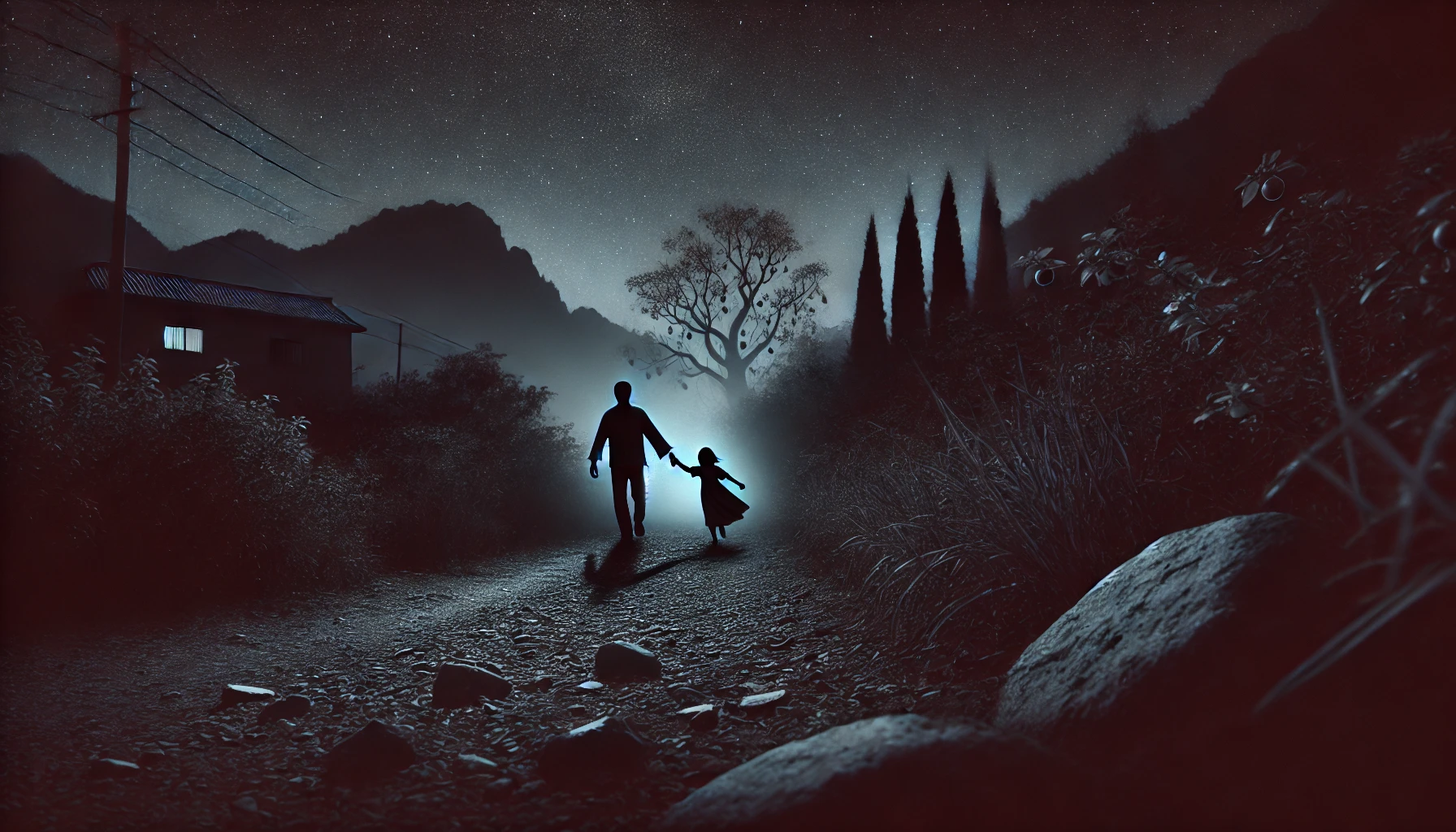
Hasan Sol
Written by A. R. Dad
Translation by Fazal Baloch
Even after so much medication and treatment, the lamp of his fortune refused to shine. His wife had also tried everything she’d been told might help. One day, a colleague at the office gave him some advice: “They say there is a jujube tree on the mountain facing this town. If you spend a day and a night in its shade, you will definitely get a child.”
He was desperate. The sorrow of being childless had eaten away at him for the last five years, and he was worn out. That very morning, he wrote an application for leave, left it on his boss’s desk, and took off. He walked and walked, asking the way, and finally, he reached the shade of the jujube tree. He felt as if the gate of paradise had opened before him. For a while, he couldn’t recall why he had come, because his body was nearly falling apart after the day-long journey. Reclining against the tree, he drifted off.
When he opened his eyes again, the silence of the night and the darkness of the forest had released a snake in the recesses of his soul. Once again, he wondered why he had come here. He seemed to have forgotten everything – who he was, what language he spoke, the whereabouts of his home village. He got up, stood silently under the tree, and cast a glance around. “I think I have seen this old man before, but I can’t remember when or where. Maybe I dreamed of him.” He wondered about it and then caressed the jujube leaves.
He felt hungry now too. He had already consumed all the provisions he’d brought for the journey. His mouth watered at the sight of the ripe jujubes. When he stretched out his hand to pick a few, a voice startled him.
“What are you seeking, standing here in this darkness?”
“Sir, I am an unlucky man. I have no offspring. The people in my clan joke that I’m sterile. I’ve been everywhere. I’ve knocked on all the doors but to no avail. I came here with empty hands so that you may fill them with your blessings.”
The jujube tree replied: “My name is Hasan Sol. Promise me that if it’s a girl, she will be my fiancée and her name will be Nokmadinah. And if it’s a boy, do whatever you and your wife wish.”
“Sir, I happily accept whatever you bestow upon me. I won’t go back on my promise. I belong to a clan whose people always keep their word.”
The sun had risen now. He looked around, relaxed and content. Hasan Sol had fallen silent amidst the morning symphony of the forest birds.
Back at the office, he spoke in a loud voice, and after finishing his tasks, he distractedly tapped his fingers on the table as if it were a drum. His co-workers sitting nearby all looked at him curiously. The colleague who had told him about the jujube tree was smiling. He was no longer the man who didn’t talk to anyone from the time he arrived at the office in the morning until he left in the afternoon. His colleagues had always wanted him to talk with them, to have a cup of tea, and discuss their salaries and current issues in the city. But being unconcerned about any of them, he had never talked to anyone or greeted them when entering the office.
Now, a year later, his colleagues were worried about his loud singing and table banging, but he remained just as indifferent towards them. He was so elated over the birth of Nokmadinah that pain, sorrow, hopelessness, and all the other sufferings people would complain about were meaningless to him. He felt nothing but happiness.
In those days, he began hanging around new restaurants in the city, and he never tired of looking at newly constructed buildings and roads. You would think he was a newcomer to the city. For him, everything was fresh. He began spending time with some old drunkard friends. Every Sunday, he went for a picnic with those friends, and he drank as well. After three or four glasses, his friends began complaining about how tough life was these days, but he seemed unmoved, having consumed the drink that lets a man forget everything for a while. At such moments, he would stand up and gaze at the trees and mountains. He never liked his friends’ complaining about the hard times.
On Monday mornings, he would get up as usual, take a shower, and leave for the office. Now he enjoyed the honking of the vehicles and the kids walking to school with their bags on their shoulders. Everything seemed filled with meaning. He had grown so used to singing in a loud voice and drumming on the table after completing his office work, that it seemed to be part of his job description.
Sixteen years later, he suddenly became sad again. One morning when he was about to leave for the office, Nokmadinah, also getting ready for school, asked him: “Dad! I dreamt of a jujube tree last night. It was as if it wanted to tell me something.”
He smiled and replied: “It’s just a dream, my child. You can dream about anything. Dreams have no meaning. Pay attention to your studies and don’t give any thought to the dreams…” He left and hurried to the office.
Everything looked exactly the same to him as it had sixteen years before. Every word the schoolchildren spoke, the honking of the vehicles, it all reminded him of his promise to Hasan Sol. He ran his hand across his face. It felt like the same face he had worn sixteen years before: a bony face without any layer of flesh. When he entered the office, a colleague took his hand to greet him, but he couldn’t utter a word, as if he didn’t know the ritual of greeting. He went forward and sank into his chair as if someone had thrown him into a well with full force.
“The jujube tree, Hasan Sol, Nokmadinah, and the dream…” He pondered and cupped his face in his hands. His colleagues who sat near him wondered what had happened. Today his pen did not move quickly like before. His work was not efficient. Nor did he sing loudly or tap his fingers on the table. It was as if he’d never done such things. As if someone else had been occupying his chair for sixteen years, and today that other man had finally returned, the one who didn’t know how to do his job or to sing in a loud voice and drum on the table.
He pondered some more: “The jujube tree, Hasan Sol, Nokmadinah, the dream, what does it mean?” He stood up and stepped out of the office. As he walked, it occurred to him that he should go to Nokmadinah’s school and ask the teacher to tell her not to dream about the jujube tree again, otherwise, he couldn’t go on living.
Right then, a car honked from far behind him. He moved to the side, crossed the road, and kept walking. He wandered about, all the while brooding about Nokmadinah’s dream, and did not get home until after midnight. His wife was still awake. He said nothing to her and lay down on his bed. Again, the thought appeared in his head: “this dream, this jujube tree, this Hasan Sol and Nokmadinah.” After quite some time, he finally drifted into sleep.
As soon as he opened his eyes, he thought of calling Nokmadinah and asking her, “Did you have that dream again?” But Nokmadinah came by herself.
“Daddy! I had the dream again and now I feel like the tree was a man who was calling me.”
“No, no, it’s not a man, my child. It’s only a dream. Dreams don’t mean anything.” Without even knowing what he was saying, he stood up and went to the bathroom.
That morning, Nokmadinah went on a picnic with her friends. After they had eaten, they climbed a knoll to take pictures and pick jujubes. Happy and laughing, they stopped near a giant old jujube tree. Nokmadinah studied the tree closely. She felt that it was the very tree that appeared in her dreams at night.
“No, no, it’s not that one. All jujube trees look alike. It must be another one.”
When they had filled their pockets and hands, and were climbing down from the knoll one by one, Nokmadinah’s headscarf got entangled in a branch of the tree. As she turned to free it, she felt someone holding her hand. She blurted out: “Ew! What kind of jujube is this.”
The sound of a voice reached her ears: “Listen.”
Nokmadinah looked around, but nobody was there. She realized that all her friends had already climbed down.
“I am the jujube tree talking to you. When you go home, tell your father to honour his promise. If you forget, you will find a wooden box at the head of your bed. Open the box. A wasp will come out and sting one of your fingers and remind you of my words.”
She freed the hem of her scarf and hurried down the slope as if being chased by a bloodthirsty beast. She was soaking in sweat. Her lips were trembling. She wanted to go home as soon as possible. Their vehicle was ready, and everyone was waiting for Nokmadinah, who had become separated from them.
She reached home at dusk and collapsed as if she had not slept for centuries. As she opened her eyes in the morning, she found her
father standing before her. He was holding a box.
“Did you bring this?”
Astonished, Nokmadinah tried to remember whether she had brought it, or if it was there before, but she couldn’t remember anything.
“I don’t know if I brought it, or if it was already here.”
She and her father both sat down in front of the box. It was a really beautiful box with carved patterns on all sides. When they opened it, all they found was an old book. Its pages had turned yellow. Her father turned the first page and read: “It is the reward of my good deeds that I have been transformed into a jujube tree, but you haven’t honoured your promise yet.”
As she read the word jujube, Nokmadinah remembered yesterday’s picnic and everything that the tree had said. She wanted to tell her father all about it, but he had already reached the door and she didn’t want to call him back.
Just as Nokmadinah was about to ask her mother what the relationship was between her father and the jujube tree, her mother coughed as if something had got stuck in her throat, and before Nokmadinah could ask her, she answered with a lie, “I don’t know, my daughter,” and left for the kitchen.
Nokmadinah was now the cause of his worst agony.
“Daddy, what does the jujube tree want?”
He could not bring himself to tell the truth and deprive himself of his daughter’s love. But concealing the facts was an ordeal for him too. Now most of the time he would wander around outside not returning home until one or two in the morning, and he would leave for the office before Nokmadinah opened her eyes in the morning. Leaving work early, wandering along unknown roads in strange parts of the city, and returning home at one or two a.m. had become his routine.
He no longer liked a single tree in the town. Whenever he came across a tree by the road, he would spit at it, and if he saw a traveller standing beneath a tree, he would scowl at him with contempt. One day he thought to himself, “If I happen to bump into Hasan Sol on these roads I’ll cut off his head,” and he kicked an empty cardboard box lying at his feet. People passing by looked at him as if he were crazy, as if he were out of his senses.
That night he spent all his money on wine. Staggering, he stumbled home, entered the house, and woke up Nokmadinah.
“Every day you ask me why the jujube tree appears in your dream or what my relationship is with the tree. Now listen. You are that tree’s fiancée; you are the fiancée of Hasan Sol, the old man who sent a box to our home.”
His shouting and screaming woke his wife, and she too got up.
“Come on, let’s go, I will take you to your fiancé’s village. I can’t bear this torture any longer.”
He held his daughter’s hand and was about to leave when his wife blocked the way.
“Kill me first and then take her away,” she said.
“Today I’m not listening to anything,” he replied. “What is death to us? Were we really alive before?” Pushing his wife aside, he took Nokmadinah by the hand and left.
Nokmadinah was speechless and confused. She didn’t know what was happening. The night was deep and dark, the road tough and steep. The fountain of love in the father’s heart had run dry. He didn’t have any hopes for his daughter anymore. All he was thinking was that tomorrow he would return to life, go to the office, sit with his colleagues, discuss what was new in town, drum on the table, and sing songs in a loud voice.
Struggling with his thoughts, he reached the jujube tree at dawn. He called out loudly:
“Hasan Sol, here is your fiancée. I have honoured my promise.” He let go of Nokmadinah’s hand and began his descent. It was as if he had relieved himself of a huge burden. He felt so light that covering the long distance back to town was child’s play to him. As if he was kicking a football on his way home.
The sun had risen. Kids were carrying their book bags on their way to school. The entire city was awake. Everyone was heading somewhere. Without looking at anyone, he went straight to a bathhouse, took a shower, shaved, and left for his office, whistling.
A slightly different version of this translation was published in Balochistan Times, 8 November 2016. https://balochistantimes.com/hasan-sol/ (retrieved 2 February 2022).


